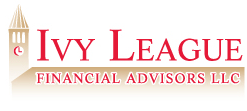-
Your website addresses the topics of Fee-Only and Fiduciary quite a bit. Why is this so important to Ivy League Financial Advisors?
Quite simply, it is the right way to do business with clients. We take a very hard line on this topic—either a Financial Advisor is a fiduciary and is solely compensated by his or her clients or they’re not---there is no in-between. If an advisor is not a Fee-Only only Fiduciary, it means that he or she has serious conflicts of interest between what’s best for the advisor and what’s best for the client. We never want to have that conflict, so Ivy League Financial Advisors has been a Fee-Only Fiduciary for its clients from day one.
-
What's the difference between Fee-Only and Fee-Based?
In short, advisors who are compensated on a “Fee-Only” basis are compensated solely by their client and not from third parties from the sale of investment or insurance product. “Fee-Based” refers to a compensation system in which an advisor may be paid on either a fee basis or via commissions from the sale of investment or insurance products. Fee-Based advisors generally arenot fiduciaries for their clients—because there is an inherent conflict of interest in the products they are using.
-
What is a fiduciary?
There are many different definitions of the term fiduciary—a legal definition, and regulatory definition, a dictionary definition and a layman’s definition. We think the best definition is as follows: “A financial advisor held to a fiduciary standard occupies a position of special trust and confidence. As a fiduciary, the advisor is required to act with undivided loyalty to the client. This includes disclosure of how the advisor is to be compensated and any corresponding conflicts of interest.” In short, it means putting the client’s interest first and doing what’s best for him or her.
-
A broker currently handles my investments. Isn't he or she a fiduciary?
Absolutely not. The broker industry’s long-standing business model is one of selling products, not providing objective advice. If the health care industry was set up like the financial service industry, doctors would have an education equivalent to a biology degree from college, work for a pharmaceutical industry, and be paid based on how many prescriptions he/she wrote. Sound crazy? Yet that is the way most financial services are still delivered through product sales.. A broker’s fiduciary duty is to his or her firm—not to his or her clients—although he or she will never tell you about this serious conflict of interest.
-
What is a Registered Investment Advisor?
A Registered Investment Advisor, or RIA, is a regulatory definition given to an advisor who offers investment advice on securities which is more than solely incidental than the professional relationship to the client. Registered Investment Advisors are regulated by the U.S. Securities and Exchange Commission (SEC) (or state regulatory authorities) via the Investment Advisor Act of 1940. A Registered Investment Advisor is, by law, held to a fiduciary standard of care in dealing with his or her clients—a standard which put the client’s interests above those of the advisor.
-
What accreditations and professional designations do you hold?
Christopher Brown is a Certified Financial Planner®. He is also an Accredited Investment Fiduciary®. Most importantly, he is a NAPFA Registered Financial Advisor®.
-
How do your responsibilities to a client differ from a broker's responsibilities to a client?
Brokers (or brokers-dealers such as representatives of wirehouses like Merrill Lynch, Morgan Stanley, or UBS) are regulated by the Securities Exchange Act of 1934 which gives self-regulatory organizations (SROs) the ability to regulate their own members. In 2007, the Financial Industrial Regulatory Authority (FINRA) was created to regulate broker dealers.
It is important to remember that FINRA holds its broker-dealers only to a suitability standard, not a fiduciary standard. A suitability standard is a much lower standard and only requires a broker-dealer to make recommendations that are consistent with the best interests of the underlying customer.
For more discussion on the fiduciary vs. suitability standard, click on this link.
-
Who do you work with as a custodian and why?
We have had a wonderful relationship with TD Ameritrade Institutional Services for over 13 years. We have found them to be very responsive to our clients needs, have reasonable fees for our clients, and equally as important, server as an advocate for investor protection. The other two large independent custodians in the industry, Charles Schwab Institutional and Fidelity Institutional have kept silent on issues of investor protection, or even worse, have supported position contrary to what’s best for their own clients. To learn more about TD Ameritrade Institutional’s steadfast commitment to investor protection, click on this link.
-
How are my assets protected at TD Ameritrade Institutional?
Your assets at TD Ameritrade Institutional Services are protected 4 ways:
- SIPC Protection
- Supplemental coverage by London Insurers.
- Asset Protection Guarantee
In addition, TD Ameritrade takes the issue of internet security very seriously. Please click on this link to learn the details about how TD Ameritrade protections your hard-earned assets.
-
How do you work with other professionals?
We work in conjunction with a client’s other advisors, such as accountants, attorneys and insurance specialists to make sure that the client’s financial well-being is addressed in a coordinated, holistic manner.
-
How often will you meet with me?
We meet with clients as often as their personal circumstances dictate—sometimes once a year, sometimes multiple times a year.
-
Do your prepare taxes?
We do not prepare taxes; however, we work in conjunction with a client’s tax advisor to develop and implement a coordinated tax strategy, as well as provide the tax advisor with the requisite supporting tax documents.

